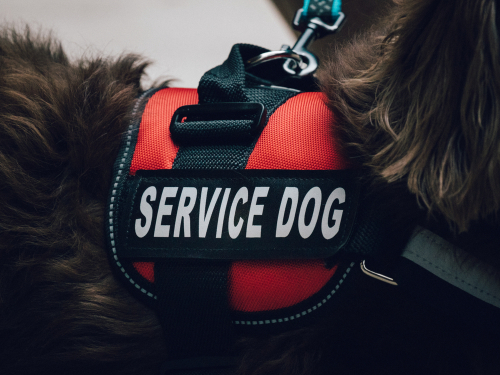A restaurant in Burlington, Vermont, recently made headlines after refusing to seat a customer with a service dog. The restaurant owner cited an incident in which a previous patron’s dog attacked a neighboring table. In addition, she refused to seat the customer because of her unfamiliarity with their dog and a history of other customers misrepresenting their dogs as service animals. The interaction, captured on video, has gone viral on social media and serves as an important reminder to employers with businesses that are open to the public.
Public Accommodation
Private employers that run public establishments must comply with two distinct titles of the Americans with Disabilities Act (ADA): Title III (which applies to places of public accommodation) and Title I (which applies to employers).
Title III prohibits disability discrimination in places of public accommodation and private entities open to the public, including restaurants, hotels, theaters, recreational facilities, doctors’ offices, pharmacies, retail stores, museums, private schools, and day care centers. In practice, this means individuals with disabilities must have equal opportunity to participate in and benefit from the business.
Under Title III, places of public accommodation (like the Burlington restaurant) are generally required to allow service animals on premises, even if pets are not permitted. The ADA limits the definition of service animal to dogs that are trained to take a specific action to assist the person with a disability.
Vermont’s public accommodations law, however, doesn’t restrict the definition of a service animal to a dog, so there’s technically no limit as to what type of animal could act as a service animal in Vermont. Service animals don’t have to wear a vest, ID tag, or specific harness.
Even if the state where the business is located has a service animal certification program, it may not require proof of state certification before allowing the service animal to enter. If it isn’t obvious the animal is a service animal, the business may ask only whether the animal is a service animal required due to a disability and what work or task the animal has been trained to perform. You may not request any documentation for the animal, require that the animal demonstrate its task, or inquire about the nature of the person’s disability.
Emotional Support Animals
There’s a distinction between service animals and emotional support animals (also known as assistance, therapy, comfort, or companion animals). Emotional support animals provide comfort just by being with a person. In contrast to service animals, they haven’t been trained to perform a specific job or task.
Emotional support animals aren’t considered service animals under Title III and aren’t required to be allowed in places of public accommodation. In contrast, under Title I of the ADA (which governs workplaces), any animal can be a reasonable accommodation for an employee with disabilities, including an emotional support animal and an animal besides a dog.
Animals as Work Accommodations
Title I of the ADA and the Vermont Fair Employment Practices Act prohibit the discrimination and harassment of disabled employees. If an employee has difficulty performing their job because of a disability, you must follow the reasonable accommodation process to determine whether a reasonable accommodation (including accompaniment by an animal) could enable them to perform the essential job functions without undue hardship (i.e., significant difficulty or expense).
An employee with a disability doesn’t have an automatic right to bring an animal (whether an emotional support or service animal, and whether a dog or another species of animal) into work and instead must request the presence of such an animal as a reasonable accommodation.
In contrast to places of public accommodation, employers may request more extensive information about the animal and the employee’s needs, including medical information about their disability and how the animal’s presence relates to their ability to perform their job. As stated above, however, employers may not request this information from their patrons.
Bottom Line
In general, you should grant an accommodation request if:
- The employee’s disability and the animal’s function are related;
- The animal would improve their ability to perform their job;
- It has had sufficient training to not disrupt the workplace; and
- The accommodation doesn’t present an undue hardship to you.
Finally, it’s worth noting that if you provide housing for an employee with a disability, you generally must allow an animal as a reasonable accommodation under the federal Fair Housing Act, and potentially under state law (including Vermont’s Fair Housing Act). As always, when in doubt, you should consult counsel.
Haley Peterson is an attorney with Dinse P.C. in Burlington, Vermont. You can reach her at hpeterson@dinse.com.

